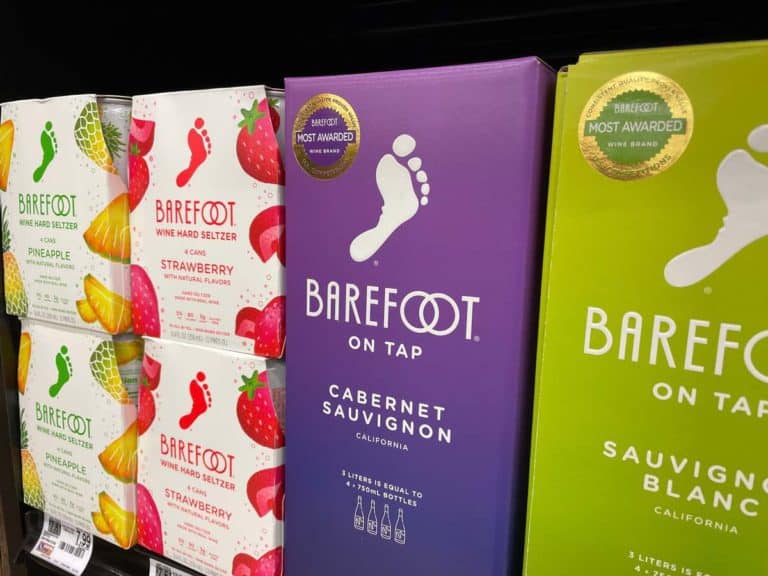Our 9 Favorite Lactose-Free Milk Brands
Many of us enjoy milk. It’s comforting to drink before bed. It’s delicious to have with cereal and cookies. Unfortunately, we can grow to become lactose intolerant. But that doesn’t mean you can’t have something close to milk. Here we talk about the 9 best lactose-free milk brands.
The best lactose-free milk brands will usually depend on flavor, nutrition, and price. You can also consider the environmental impact. For our list, we believe the Organic Unsweetened Soymilk from Silk is the best choice. Our next non-soy choice would be Elmhurst Unsweetened Milked Oats.
Here you’ll find more about our top best lactose-free milk brands. You’ll also learn our reasons for choosing these brands. If you disagree with our list, you can use our criteria to see which brands are best for you.
How To Choose The Best Brands
Dairy milk is hard to replace but doing so isn’t impossible. If you want to find the best lactose-free milk brands, you’ll need to first know what makes milk so great. Once you know these qualities, then you can look for these same qualities in other products.
Milk Is Nutritious
Milk is a complete food; hence it is the perfect food for growing babies.
Milk is rich in protein, carbohydrates, and fats. It also has minerals like calcium, phosphorus, magnesium, and potassium.
Calcium is readily absorbed by our bodies. Milk is also a rich source of vitamins B2, B12, A, and D. These nutritional qualities are what makes milk a great food for growing babies.
Milk Is Delicious
Beyond the nutritional qualities that make people love milk is the sensory experience. Simply put, milk is delicious.
Milk sugars provide a sweetness that is pleasant and not overpowering. The fats in the milk give a natural creaminess. The fats and sugars also interact to bring out each other’s flavors. The two synergize for a delicious experience, like how the sugars and fats make a cake or donut delicious.
The proteins also give creaminess as well as nutritional value. However, it’s the milk protein called casein that satisfies us when we drink milk. When our body digests casein, it produces a substance called casomorphin. Casomorphin can enter our brain and stimulate it to release dopamine. Dopamine is a chemical that makes us feel pleasure and comfort.
Why Replace Dairy Milk
Unfortunately, dairy milk isn’t all good. While there are many reasons to consume dairy milk, there are also many reasons to stop.
We Don’t Need Milk
As you read earlier, milk is the perfect food for growing babies. You’re probably not a baby anymore, so there’s no biological need to consume milk.
We can get the nutrients from milk from other foods. And we can use milk substitutes in recipes that call for milk. The main reason many continue to consume milk is simply for enjoyment
Milk Isn’t Meant For Humans
The milk you drink is probably from a cow. Hence, that milk was and is meant for baby cows. So far, humans are the only animals that drink milk from another species.
Milk Has Ethics Issues
Since milk is meant for the babies of another species, it was taken from those babies. The dairy industry has also faced many animal welfare issues. For animals like cows to produce milk, they need to get pregnant. Hence, cows are forcibly impregnated.
Once those cows give birth, the calf would need milk. However, the calf isn’t allowed to drink the milk because milk is the product. Hence, the mother cow and calf are separated. The separation can bring psychological trauma to both the mother and the calf. If the calf is female, then she is recycled back into the dairy industry. If the calf is male, then he is put in the beef industry.
The cycle of forced impregnation and separation continues. It only stops when the mother cow can no longer lactate. By that time, she’ll be sent to the slaughterhouse. It’s grim, but it’s the reality for some, if not many, dairy farms.
Milk Is Also Linked To Health Problems
There are plenty of studies that link milk consumption to health benefits. But there are also plenty of studies that link milk to health problems. Some of these health problems are acne vulgaris and an increased risk of cancers.
Lactose Intolerance
Lactose intolerance is one of the biggest reasons people stop consuming dairy products. Lactose is a sugar in dairy. During infancy, we have an enzyme in our body called lactase. Lactase digests lactose. As we grow, our body can stop making this enzyme.
Hence, we can no longer digest lactose. And if we continue to consume lactose, we get digestive problems. These problems include farting, diarrhea, cramps, and more. Some people are lucky because their body continues to produce lactase in adulthood.
Related Article: Why Does Lactose-Free Milk Taste Sweet
9 Lactose-Free Milk Alternatives
We’ll assume that lactose intolerance is the main reason you want to find lactose-free milk brands. Now that you know the good and the bad about milk, you can make better choices in milk alternatives. Below are our best lactose-free choices.

1. Silk® Unsweetened Organic Soymilk
Soy has gotten a bad rap. A reason people avoided soy is the phytoestrogens. Phytoestrogens are plant molecules that resemble estrogens. Estrogens are a hormone that is important in female health. People worry that eating phytoestrogens will mess up their hormones.
But studies in the past years have shown that phytoestrogens don’t have the same effect as an animal or human estrogens. There are even studies that show that phytoestrogens from soy and other plants can be healthy.
These benefits include lower risks for cancers, bone health, cardiovascular health, and more. Today, more people are accepting that it is okay to consume soy products.
Of all the plant milks, soymilk has nutritional properties that matches cow’s milk. Below are some of the nutrition facts of the Silk Unsweetened Organic Soymilk.
- Serving size: 1 cup (240 mL)
- Calories: 80
- Total Fat: 4g
- Saturated Fat: 0g
- Polyunsaturated Fat: 2.5g
- Monounsaturated Fat: 1g
- Cholesterol: 0mg
- Total Carbohydrates: 3g
- Dietary Fiber: 2g
- Total Sugars: 1g
- Added Sugars: 0g
- Protein: 7g
In contrast, below are the typical nutrition facts of a cup (249 g) of cow’s milk that is 3.25% fat. The data below are from the US Department of Agriculture.
- Calories: 148
- Total Fat: 8g
- Saturated fat: 4.6g
- Cholesterol: 24.4mg
- Total Carbohydrates: 12g
- Dietary Fiber: 0g
- Sugar: 12g
- Protein: 8g
If you are trying to avoid excess sugar, saturated fat, and cholesterol, then you may want to prefer this soymilk from Silk. Moreover, this soymilk is fortified with a vitamin and mineral blend. The vitamins and minerals are Calcium Carbonate, Vitamin A Palmitate, Vitamin D2, Riboflavin (B2), Vitamin B12.
Moreover, this soymilk is certified USDA organic. Silk claims that this product is made from whole-harvested soybeans grown in the US and Canada. The health and environmental benefits of organic foods are still disputed. But you can rest a bit easier because this soymilk is free from possible dangerous chemicals.
Soy is abundant. Soymilk production is also well-established. Hence, soymilk isn’t as pricey as other plant-based milk. And because soymilk is plant-based, it takes less environmental resources to produce it. Thus, this soymilk from Silk ticks our boxes for nutrition, flavor, price and environmental impact.

2. Edensoy® Unsweetened Organic Soymilk
Our second pick is another unsweetened organic soymilk from Edensoy. A strong advantage of Edensoy’s soymilk is that it currently has the highest amount of whole soy protein of any US soymilk brand. Below are the nutrition facts.
- Serving Size: 1 cup (240 mL)
- Total Fat: 6g
- Saturated Fat: 1g
- Trans Fat: 0g
- Cholesterol: 0mg
- Total Carbohydrate: 4g
- Dietary Fiber: 0g
- Total Sugars: 2g
- Added Sugars: 0g
- Protein 12g

3. Westsoy® Organic Unsweetened Plain Soymilk
Our third pick is also an organic unsweetened soymilk from Westsoy. Below are the nutrition facts.
- Serving Size: 1 cup (240 mL)
- Calories: 100
- Total Fat: 5g
- Saturated Fat: 1g
- Trans Fat: 0g
- Polyunsaturated Fat: 3g
- Monounsaturated Fat: 1g
- Cholesterol: 0mg
- Total Carbohydrate: 4g
- Dietary Fiber: 1g
- Total Sugars: 3g
- Added Sugars: 0g
- Protein 9g
Honestly though, these soymilks from Westsoy, Edensoy, and Silk can easily exchange spots. It depends on the person’s opinion.
We put Silk above Westsoy and Edensoy because Silk has less calories. You can argue that Edensoy’s soymilk should be on top because it has the most protein.
True, but remember we also look at the taste. And in our opinion, Silk’s soymilk is tastier. If protein is a concern, we can get that from other foods.
Soymilk from Edensoy and Westsoy also have only 2 ingredients: water and soy. For many, that is a good thing. The Silk soymilk has added vitamins and minerals to raise its nutritional value. It also has gellan gum that acts as a thickener and stabilizer.
Like soy, gums get a bad rap. In truth, they’re just carbohydrates. Their use as a thickener or stabilizer is no different than how we use starches or flour to thicken soups.

4. Elmhurst® Unsweetened Milked Oats™
Oat milk gained so much popularity in recent years. For our number 4 pick, we choose the unsweetened miled oat from Elmhurst. Below are the nutrition facts.
- Serving Size: 1 cup (240 mL)
- Calories: 80
- Total Fat: 1.5g
- Saturated Fat: 0g
- Trans Fat: 0g
- Cholesterol: 0mg
- Total Carbohydrate: 14g
- Dietary Fiber: 2g
- Total Sugars: 1g
- Added Sugars: 0g
- Protein: 4g
This oat milk has 20 g of whole grain per serving. Whole grains are rich in fiber that are good for our gut microbiome. We love that this product only has 3 ingredients. These 3 are filtered water, whole grain oats, and salt.
Elmhurst Unsweetened Milked Oats has a creamy texture without gums and other thickeners. Elmhurst does it using a unique method called HydroRelease™. HydroRelease™ uses only water to extract the nutritional components of the grain.
But while it does that, it keeps their individual integrity. Then these components are put back together into a creamy beverage.
5. Thrive Market Organic Unsweetened Oat Beverage
We put Thrive Market’s oat beverage below Elmhurst’s oat milk mostly because it has more calories. Thrive Market’s oat beverage also has 13 g of sugars, though these aren’t added sugars.
As for taste, we think both are equally great, so our ranking is mostly because of the nutritional value. But if you don’t mind the calories and sugars, then you can easily exchange their spots. Below are the nutrition facts.
- Serving size: 1 cup (237 mL)
- Calories: 110
- Total Fat: 2g
- Saturated Fat: 0g
- Total Carbohydrate: 20g
- Dietary Fiber: 1g
- Total Sugars: 13g
- Protein: 3g

6. Horizon® Organic Lactose-Free Reduced Milk
Remember lactase? It’s the enzyme that digests lactose. Well, we can now create lactase in the lab and add it to dairy. Doing so pre-digests the lactose. Not only is this milk free of lactose, it is also organic.
For milk to be USDA certified organic, the cows don’t receive hormones for lactation. Their feed must be grown without synthetic pesticides. The farmers are required to put the cows out to pasture during the entire growing season. The grazing season must last at least 120 days out of a year. Lastly, the cow must receive at least 30% of its nutrition from grazing during this season.
Below are the nutrition facts for Horizon Organic Lactose-Free Reduced Milk.
- Serving Size: 1 cup (240 mL)
- Calories: 130
- Total Fat: 5g
- Saturated Fat: 3g
- Trans Fat: 0g
- Polyunsaturated Fat: 0g
- Monounsaturated Fat: 1.5g
- Cholesterol: 20mg
- Total Carbohydrate: 13g
- Dietary Fiber: 0g
- Total Sugars: 12g
- Added Sugars: 0g
- Protein: 8 g

7. Silk Unsweetened Cashew Milk
Here’s another one from Silk, and it’s their cashew milk. It has the unique creaminess and flavor of cashews that we enjoy. We put it above the more popular almondmilk for one main reason. It takes less water to grow cashews than it takes to grow almonds.
We didn’t compare the taste between the two because they’re made from different nuts. It would be like comparing apples and oranges, or in this case, cashews and almonds.
Honestly, though, any brand of plain unsweetened cashew milk can take this spot. We just prefer Silk’s overall because of the price, taste, and nutritional value. Like many Silk products, this cashew milk is fortified with vitamins and minerals.
You mostly drink cashew milk for the taste. A cup of plain unsweetened cashew milk, regardless of the brand, typically has 25 calories. Most of those calories are from the natural fats of the nuts. There are negligible proteins and carbohydrates.
8. Almond Breeze® Unsweetened Original Almondmilk or Silk Original Unsweetened Almondmilk
We couldn’t decide on this one. The nutritional values between the two are almost identical, and both taste great. Hence, we decided to make it a tie.
Like with cashew milk, you don’t drink almond milk for its nutritional value. A cup of generic plain almond milk typically has 30 Calories. It’s not so different from cashew milk. Again, most of those calories are from the fats of the nuts. There are negligible proteins and carbohydrates.

9.Califia Farms® Unsweetened Oat Milk Barista Blend
One of the things for which we use milk is coffee and tea. Both dairy and plant-based milk can work well with shakes, cereal, and other foods. But they may not fair too good with coffee or tea. The hot temperature and acidity of these drinks can cause the milk to curdle.
This oat milk from Califia Farms was specifically designed to work well with coffee and tea. It is rich and creamy without gums or stabilizers. It steams, froths, and foams like dairy milk. It also has a delicate, malty taste that doesn’t compete with coffee flavor
To achieve those barista blend features, this oat milk has more fat and less protein. Thus, this milk is lower on the list. However, you won’t really use this milk for nutrition. This is strictly for coffee and tea.
We know there are other lactose-free milk types or brands out there. There’s rice milk, coconut milk, macadamia milk, and more. But we had the tough job of narrowing them down.
Do you agree with our list?





